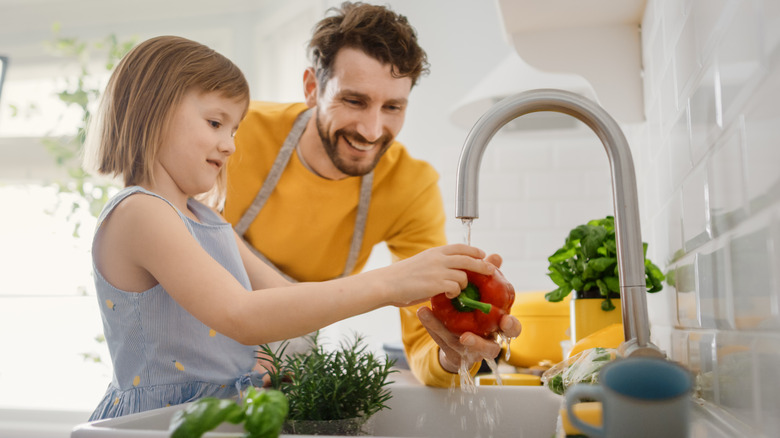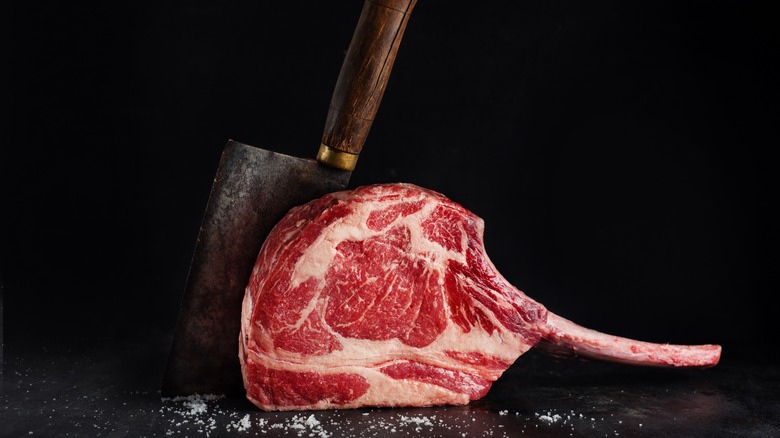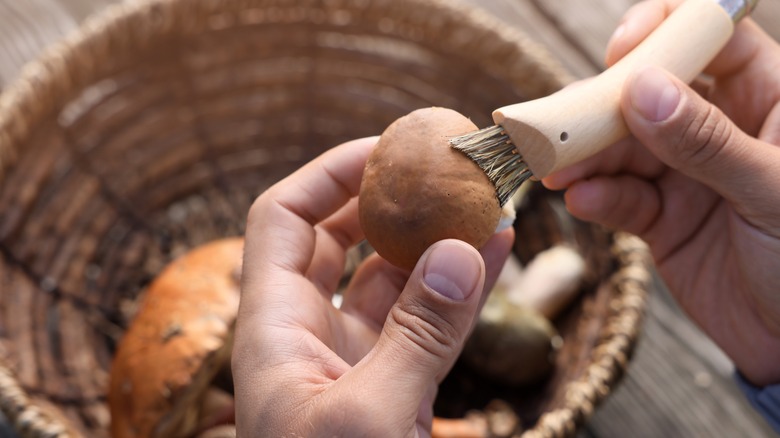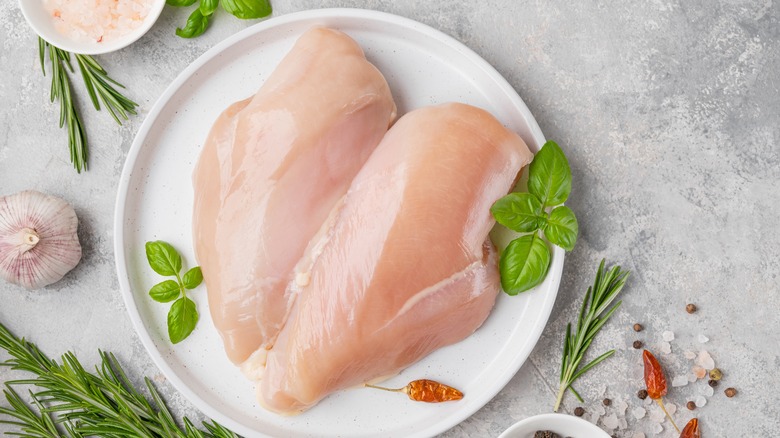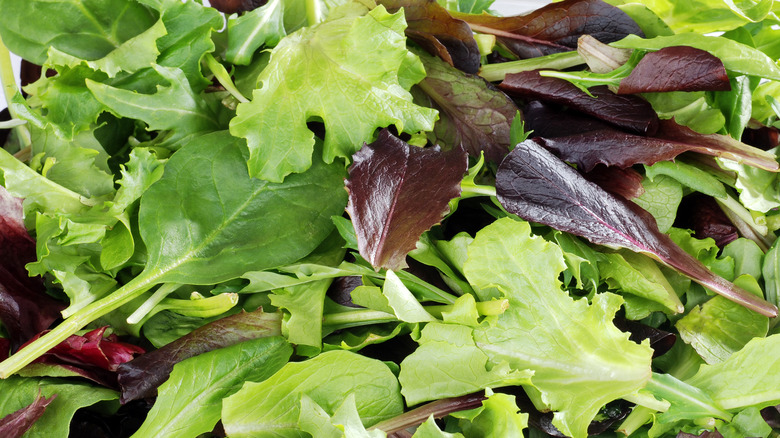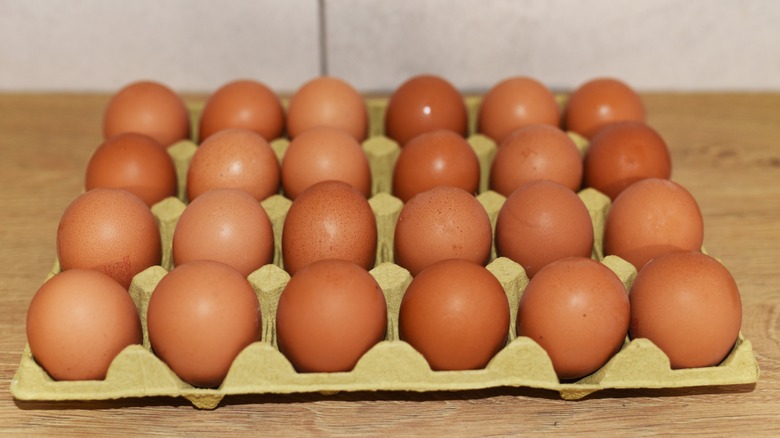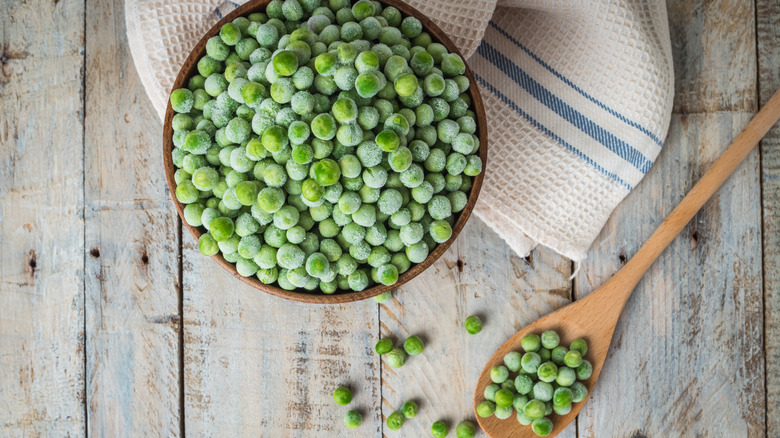10 Foods You Don't Actually Have To Wash
Good food hygiene is essential. In addition to washing our hands before preparing and storing our fresh produce correctly, a large part of maintaining proper hygiene in the kitchen is knowing when to wash foods. It's important to wash a wide variety of foods correctly before we prepare and eat them, as microbes and bacteria can make their way onto our items at pretty much any stage of their journey to our plate. By washing our food correctly, particularly fresh produce like fruits and vegetables, we're ensuring that we keep any pesky germs at bay and reduce the risk of food poisoning.
But perhaps because washing some food items is so important, somewhere along the line, we started putting more and more foods under our tap to rinse. And while we salute the commitment to food safety, we're here to put a stop to some of those washing activities. Washing some foods is not only needless but may actually get in the way of their proper preparation — and in some cases, the cleaning process could spread even more bacteria than we had to start with. So which foods don't you need to wash? We've got them right here.
1. Red meat
Of all of the food items out there that can cause food poisoning, few produce as much anxiety as red meat. Undercooked or mishandled red meat can harbor bacteria such as Salmonella or E. coli, with the latter especially likely to thrive in beef, explains NHS Inform.
But, if your strategy to avoid food poisoning from red meat includes washing it, we recommend you turn that tap off. Washing raw red meat is not only pretty pointless on a hygiene management level, as it doesn't really remove bacteria, but it can also spread bacteria clinging to the surface of the red meat around your kitchen. This red meat mistake just makes your food preparation area even more unsanitary and increases the risk of food poisoning. Importantly, bacteria can spread further than you think, up to 3 feet from your sink, so even scrubbing said sink thoroughly afterward may not be enough to fully remove the risk of getting sick.
Aside from that, washing red meat can degrade the quality of your steak or lamb chop and get in the way of its cooking effectively. Instead, remember that if you cook your food correctly, at a high enough temperature, any bacteria in it should be killed, making your red meat safe to eat. Watch out for any signs of discoloration or strange smells coming from your meat, and throw it away if you're unsure that it's still good.
2. Risotto rice
Okay, so let's have a show of hands, people: Who here has heard that you always have to wash rice? All of you? That's what we thought. Whether you do so or not, washing rice is an important step in the quest to achieving fluffy, plump grains, and for medium and long-grain rice, it's vital to remove chemicals, debris, and excess starch.
But contrary to popular belief, washing is not essential every time you cook with rice, and if you're making a risotto, you should steer clear. Short-grain risotto rice, which is starchier than other rice varieties, should never be washed before you cook it. The reason for this is that the starch content is a crucial component of the eventual texture of the dish and helps it all adhere together. The same rule applies if you're making paella or any other Spanish rice dishes, which are usually made with medium-short grain rice originating in Valencia, advises Andalucia.com. If you do so, the outer layer of starch, which is so important to the final result, will be removed, and your paella won't come together as it should.
3. Mushrooms
People who cook with mushrooms regularly will know how when you open up a packet of them, half of the field they're grown in can fall out. Seriously, how do they get so much soil lodged in them? And this, naturally, creates a need for them to be cleaned before eating. But if you're tempted to give them a rinse, you'll be washing it wrong.
Mushrooms are one of the more porous ingredients out there, and this spongy consistency means that they soak up some of the water they come into contact with, explains EatWright. This water then sticks inside your mushrooms until you cook them and gets in the way of the cooking process. When the mushrooms are heated up, they release this additional water, not only leaving you with soggy mushrooms but also potentially watering down the other components of your dish.
The good news, though, is that to clean mushrooms, you usually don't need any water at all. For a little bit of dirt, just get a dry brush and scrub them. This should be enough to clean them up enough to cook them then. If that's not enough, a damp paper towel can be used in place of the brush.
4. Chicken
For some people, cleaning their raw chicken is the first step in cooking it. But if you routinely rinse your chicken breasts, we implore you to stop. Washing chicken, as well as other types of meat, in the sink is one of the worst things you can do on a hygiene level in the kitchen.
When you put raw pieces of chicken under a running tap, water droplets splatter everywhere, and these droplets could be harboring the very bacteria you're trying to get rid of. Chicken is particularly risky for having Campylobacter and Salmonella bacteria, and infection with the latter can lead to some nasty symptoms, including fever, cramps, and other gastrointestinal issues. And when that bacteria splashes all over the sink, and in some cases feet away from the tap itself, you just increase your chances of getting infected.
Generally, raw chicken should be perfectly fine to cook straight out of the packet, states the CDC. But the main thing you can do to avoid the risk of chicken causing food poisoning is to cook it properly. If you're unsure, a food thermometer is your best friend. Stick it into the thickest part of your chicken and make sure that it reads at least 165 degrees Fahrenheit. When it reaches that temperature, it's fully cooked.
5. Prewashed salad
Arguably the biggest selling point of prewashed salad is that it's, well, prewashed. But surprisingly, despite all of the hard work already being done, some people may voluntarily choose to wash their prewashed salad again.
But here's the thing, folks: Not only is washing prewashed bagged salad adding needless labor to your meal, but it's also actually pretty unwise. Salads labeled as prewashed are cleaned just before they're bagged up, and this usually occurs in a commercial setting that's designed to deliver the best sanitization possible. When you take the prewashed salad out of its bag and wash it yourself in the kitchen sink, though, you could be introducing it to some less-than-sanitary conditions. Unwashed hands, an unclean sink, and dirty strainers may all introduce bacteria to your salad.
So, instead of focusing on whether your salad is clean or not, focus on whether it's in good condition. If you notice that any of the leaves in the bag you pick up are wilted or look slimy, you should leave them in the store — and if you've already brought them home, throw them out.
6. Eggs
We make no secret of the fact that we love eggs. Like, seriously love them. Boiled, scrambled, fried — you name it, we're here for it. And the one thing that makes eggs even better for us is knowing that you don't have to wash them before cooking them.
While some people may make it a habit to wash their eggs, it's a mistake to do so. "Eggs are sorted and washed before being packaged and shipped to us for use. So, unless you are getting your eggs 'directly' from the chicken there is no need to rewash them," states celebrity chef Jennifer Booker. Washing eggs before sale has been standard practice in the food industry since the 1970s, according to the U.S. Department of Agriculture, so washing them at home again will just repeat a process that's already been done.
Washing your eggs may make them even more susceptible to becoming unsanitary. After washing their eggs in an industrial setting, egg suppliers sometimes coat them with a protective layer, which stops microbes from making their way through the porous shells. However, washing them when we get home can remove this protection and thereby leave your eggs more vulnerable to bacteria making their way inside. As such, it's best to leave your eggs alone, folks.
7. Pasta
Truly the food of the gods, cooking up a quick bowl of pasta is about as convenient as meal preparation gets. But if you're washing your pasta, either before or after cooking it, you're making things both less convenient and less delicious.
Pasta should be placed directly into the water from your packet without rinsing it, says Home Cook World. A huge part of what makes pasta so delicious is its high starch content, and when you wash it before boiling, you get rid of some of the starch on its surface. This means that you'll end up with less overall starch in your meal, and it'll be harder for the pasta to hold onto any sauce you add. The same thing can happen when you rinse pasta after cooking it, with all of that tasty and helpful starch making its way straight down the drain, along with any seasoning you added to the pasta water.
The one situation where you should wash pasta, however, is if you're not planning on serving it hot. For noodles used in a cold pasta salad, rinse them briefly after cooking. This will stop the pasta pieces from continuing to cook after removing them from the pan, and from sticking to each other while they cool.
8. Frozen fruits and vegetables
Frozen fruits and vegetables are one of life's true conveniences and are ideal for when you need a hit of nutrition without wanting to drag yourself to the store for fresh produce. But as we're constantly told that we need to wash our fruits and vegetables before eating them, surely the same rule applies to frozen fruit and veggies, right?
Wrong. Frozen fruits and vegetables are good to go straight out of the bag, without any additional washing needed. This is because both frozen fruits and vegetables are cleaned and washed before they're bagged, explains the American Frozen Food Institute. It doesn't get much more convenient than that.
Additionally, frozen vegetables like peas, beans, or broccoli are often cooked briefly before bagging, undergoing a blanching process. This brief dip in boiling water or steam helps to further sanitize the product, while also assisting in its preservation process. The quick freezing that frozen fruits and vegetables undergo serves to lock in key nutrients, which is part of what makes frozen vegetables just as nutritious as fresh ones (per Healthline).
9. Turkey
The perfect holiday turkey is a yearly quest for a lot of people, and the last thing you want is for your guests to start to feel a little queasy a few hours after the Thanksgiving meal and potentially have to endure food poisoning.
It's for this reason that washing turkey has become standard practice for some folks, but we recommend against it. Washing a turkey, like washing other meat, is risky because it raises the risk of spreading bacteria all around your kitchen as it splashes off the bird's carcass. This is only heightened by the sheer size of a full turkey and its ungainly shape, meaning that it's not as easy to wash as small breast or thigh portions and you're therefore more likely to splash bacteria-containing water around.
The truth is, to get rid of any bacteria residing on your turkey, all you have to do is prep and cook it properly. Pat your turkey dry, both inside and outside, with a paper towel, dispose of it immediately afterward, and wash your hands. Then, roast your turkey until a meat thermometer measures 165 degrees Fahrenheit in the thickest part of the bird. If you're dead set on brining your turkey, make sure you dispose of the water used safely, avoiding any splashing.
10. Fish
Given that fish spend their whole lives in water, it's somewhat curious that some people want to wash it before cooking — but they do. And they really shouldn't.
Fish and seafood, like meat and poultry, carry the potential to cause food poisoning through Salmonella, explains the Australian Institute of Food Safety, as well as through ciguatera or scombroid poisoning, two nasty forms of food poisoning that produce unpleasant symptoms (per Family Doctor). Unfortunately, though, washing fish doesn't reduce the risk of picking up these forms of food poisoning, and as a matter of fact, doing so could make contracting them more likely. This is because as you wash your fish, you're splashing potentially infectious water around your sink and kitchen, heightening the potential for illness (via FoodSafety.gov).
Instead, simply follow some basic hygiene rules. Keep your seafood separate from other foods and prepare it using a separate chopping board. After preparation, make sure you wash your hands before you touch anything else and ensure that all seafood is cooked thoroughly, disposing of any products that look or smell as though they've gone bad. The one exception to washing seafood is with mussels, as they can often retain sand, grit, and dirt from the sea.
